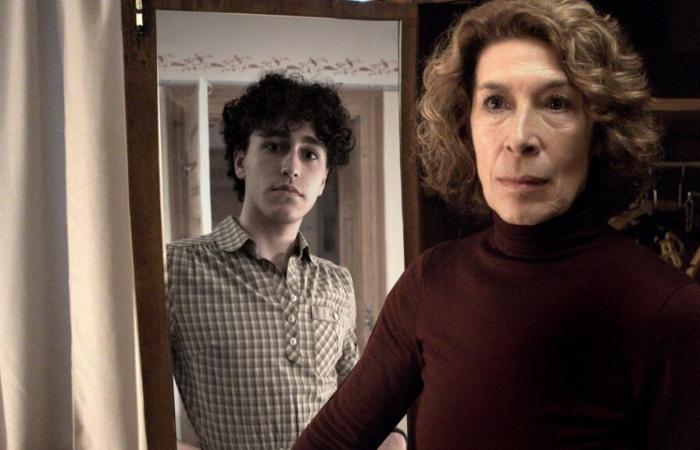In “Unvarnished” you once again play a character created by screenwriter Uli Brée. Among other things, he invented the character of “Tatort” detective Bibi Fellner for you. Did Bree also write the role of Josefa specifically for you?
Basically yes. Over the many years that he has accompanied me as an author, Uli Brée knows what he can do with me (laughs). What he can expect of me, how he can challenge me – and what could be nicer than someone who challenges and encourages me like that. Uli is always full of ideas; I just finished filming a two-parter of his that was actually supposed to have been filmed after “Unvarnished”. But then I injured myself while filming…
What happened?
I had a bicycle accident a day and a half before filming ended. I broke my shoulder and had to have surgery. I now have a plate with nine screws in it. “Unvarnished” demanded a lot from us, not only because of this accident, but the film also gave us gifts in an incredible way.
To what extent?
Even if the film refers to a topic such as being trans, it is primarily about accepting oneself. About becoming one in yourself. And about the fact that the injuries that you inflict on others and yourself as a result of this self-discovery must at some point be forgiven. I believe that this is a fundamental theme of our humanity: we have to learn to forgive.
That’s why this film is so important, and it tells it very cleverly. With these signs of a queer history, which are also absolutely important to be discussed. But of course, even though we may have gone through this process of gender reassignment, we are still human beings. My colleague Hayal Kaya, who plays my friend Antonia in the film, is trans – but first and foremost she is a human being.
How did you prepare for the role?
I really had to read up, understand and speak up. I spoke to those affected, watched documentaries and read literature to get involved in this whole process. What it also means physically, how painful and intense gender reassignment is. Despite everything I learned, the basic tenor was that the joy of finally being what you had always felt outweighed the pain and fears.
If this feeling that you have always had about yourself coincides with the external image. In order to do justice to the topic, I had to undergo this preparation. But then I could and was allowed to forget about it while playing.
What was important to me in my implementation was what the projection caused to the viewer. Because when we know we’re sitting across from a trans person, we think we’re seeing more than we’re given. That’s why I consciously tried to remain feminine when playing the role. I wanted to leave that up to the viewer. So that at some point he or she grabs themselves by the scruff of the neck and realizes: Oh! So if he or she really looks.
She was “fighting for her survival,” says Josefa in the film. This refers to Upper Bavaria in 1988. How would you assess the current situation of trans people in this country – do they still have to “run for their survival”?
This is an exaggeration, but in some ways it is still the case. It is a topic that has not yet reached everyone’s hearts. It is not the case that we simply accept it as a given and self-evident, not even in Germany or Austria. There is often behavior as if trans people pose a danger. Exactly the opposite is the case. These people are usually more peaceful than others. Above all, they want acceptance and to be understood.
There is often a behavior as if trans people pose a danger. Exactly the opposite is the case.
Adele Neuhauser, actress
How do you think the topic of trans identity has been addressed in the media so far?
For a while I had the impression that it was discussed too much and, above all, too sensationally in the media. That’s exactly the point: It is the wish of all trans people that it is not kept quiet, but also that it is not viewed with this gaping curiosity. But rather that the topic is discussed in an honest, open and empathetic manner.
It is something that concerns many people and of course has its place in the world. What a presumption to say that only what appears to be “normal” has this justification!
You play a woman without actually being one yourself. What do you think of demands that, for example, only homosexuals should play homosexual characters and only trans people should play transident roles?
This request has not yet been brought to my attention. I asked myself this question in conversations with those affected: How do they feel about me playing this? They had no problems with it, zero. I think it’s problematic if you look at it with a sensationalist, not really empathetic view. But I play all my roles with the greatest dedication and the greatest possible engagement. And that’s why I don’t feel addressed.
Recommended editorial content
Here you will find external content selected by our editors to enrich the article with additional information for you. Here you can display or hide the external content with one click.
Show external content
I agree that the external content can be displayed to me. This means that personal data can be transmitted to third-party platforms. You can find more information about this in the data protection settings. You can find these at the bottom of our page in the footer, so you can manage or revoke your settings at any time.
Vocal cord surgery in 2008 made her voice higher. You said in interviews that it changed your life and also your personality. Did this experience make it easier for you to approach Josefa?
Yes, she did. Before this operation, I was repeatedly addressed as Mr. Neuhauser on the phone because my voice was incredibly deep. After the healing process, I really felt more feminine. But my entire life story also fits in with this: in my childhood and youth I felt this big discrepancy that cost me a lot of strength.
As I write in my autobiography, I was truly my own worst enemy. The reason was fears, but also all the hormonal madness that you are exposed to as a young person. Every one of us goes through this! Because we are dual beings, we all have the potential for both genders within us. And we constantly challenge this opposite gender within us.
You allude to several suicide attempts that you made as a child and teenager. Why did you decide to go public with this very personal topic?
Because through my visibility and the luck of having survived, I feel like I can perhaps help people who find themselves in seemingly hopeless situations and show that it is possible to get out of this dark hole. And because I want to advocate that you should definitely ask for help and undergo therapy. Unfortunately, I didn’t do that myself, which is why I struggled with it for so long.






